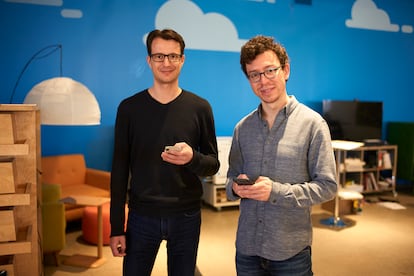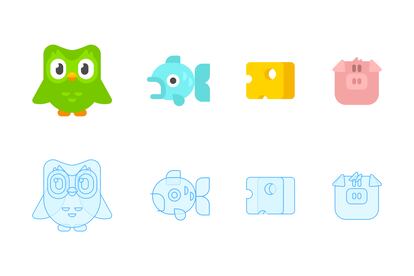Duolingo: 24 million people hooked on learning languages with just one click
The free mobile application captivates users with its game mechanics, challenges, and streaks that are typical of social media and video games: ‘We’ve been told that we are almost as fun as Candy Crush’

Duolingo has metrics that are typical of an entertainment application, not one for teaching. Every month 83 million people log in to learn one of the 42 languages of offer, 24.2 million of whom do so every day (10 million more than the previous year). It is the educational application with the most downloads in the world. Guatemalan Luis von Ahn, one of its two founders, cannot wait to share its secret formula, proselytizing so that people copy his idea. “You only learn outside of class if you are motivated, and we do everything we can to keep people coming back to Duolingo. We use the same techniques as mobile games and social media,” the mathematician acknowledges in a video conference from the company’s headquarters in Pittsburgh, Pennsylvania.
“Each lesson has to last about three minutes, and people have to feel that they did well,” he continues. For example? “We make exercises that have an 80% probability that learners will respond correctly,” he confesses. If it’s too easy or too difficult, you’ll quit. There is no shortage of challenges and rewards, the mascot — a small green owl — encourages you to continue if you have not logged in, and the app highlights the streak of consecutive days of doing tasks. You can also get points, and there is even a virtual currency.
“When asked why they are using it, the vast majority of our users respond: ‘Duolingo is almost as fun as Candy Crush and, at least, I’m not wasting my time,’ Von Ahn says proudly. “Or they say, ‘Now I spend a little less time on Instagram because I’m learning French,’” he continues. In his opinion, the debate on children’s access to technology is redundant: “It is inevitable. What we are trying to do here is make using the screen useful, at least.”
In his entertaining talks with a viral audience, Von Ahn reviews his “rich” upbringing without being wealthy, since his mother, who raised him by herself as an only child, invested her resources in him. He graduated from the American School of Guatemala and this opened the door to Duke University, where he graduated, and Carnegie Mellon, where he received his doctorate.
The return of languages
The app was developed at Carnegie Mellon in 2009. That year, Von Ahn, a mathematician and lecturer in Computer Science, became a millionaire after selling Recaptcha — the system that forces you to prove that you are not a robot — to Google and, although he thought about retiring at the age of 30, he was excited to invent an educational tool that would facilitate teaching the most disadvantaged. And he opted for languages, which have a quick return. “Knowing English increases one’s salary quite a bit in almost any job. In Guatemala it is almost double. If you are a waiter or an office worker, for example, it is worth a lot to you.”
Uriel Kejsefman, product manager at Duolingo, enjoyed an experience similar to Von Ahn’s. “I grew up in a middle-class Argentine family, and ended up studying in the United States thanks to English. That experience completely transformed my life,” he told EL PAÍS at the Qatar Foundation’s WISE educational summit. In his opinion, the international team of people from 30 countries shares “the mission of expanding these types of opportunities to more people.” Kejsefman studied at Yale and Harvard and, after working in the Education Department of the World Bank, he landed at Duolingo two years ago. In his opinion it was a natural step: ”It was evident that, in a post-pandemic world, education was going to advance from the private sector and from technology in particular.”
Duolingo has become extremely professional and is a company with more than 700 workers, including engineers (45%), designers (13%), teachers (9%), publicists, strategists, and many more. But it was not always like this, because Von Ahn was one of the pioneers of crowdsourcing — the outsourcing of tasks to a large group of people through an open call — and founded a course incubator. “At first we created the courses with volunteers and that meant that a lot of them were really created by popular demand,” explains Kejsefman. For example: “The Irish created the Irish [Gaelic] course with our tools, and it is used by most of the people learning the language,” the Argentine says proudly. “At some point, when we were making like over $100 million a year, it felt weird to still be using volunteers. And we decided to start paying everyone,” the Guatemalan co-founder adds with a laugh. In 2019 they began to advertise, in 2021 they went public, and artificial intelligence now forces them not to sleep.
“Today we are going slower, the focus is on making sure that what we have is very good quality,” explains Kejsefman, who speaks seven languages and practices his German with the app. Half of the users learn English, another 20% Spanish, and another 10% French, but their catalog includes endangered languages, such as Navajo, Hawaiian or Haitian Creole, and oddities such as High Valyrian (from Game of Thrones) and Klingon (from Star Trek).
For four years, Eduardo González-Mora, professor of Engineering at the Autonomous University of the State of Mexico, has been studying Esperanto. He tells EL PAÍS by email that he was motivated to learn it by reading the novel The Salamander War, by Karel Čapek, in which the amphibians speak the language. He uses the app at least 30 minutes a day. “On my trips abroad I talk with others and I usually write my notes in Esperanto,” he says.

In a short time, artificial intelligence will translate and dub any recorded material — Coursera is already doing it — but Kejsefman does not believe that people will lose interest in making themselves understood face-to-face, and the testimonies on social media seem to agree with him. Juan wants to speak some Italian to travel to Tuscany; Julia wants to say things in Swedish to her summer date; Antonio longs to soak up everything Japanese (cuisine, manga, and language); Blanca, a K-pop fan, is struggling with the rudiments of Korean. Von Ahn is especially surprised by the exponential growth of this Asian language in parallel with the musical craze.
Job opportunities are, however, the main driver for downloading the application. It looks very clear on a world map. In English-speaking countries people study Spanish (in Canada it’s French, their other official language), in Balkan Europe it’s German, and in Sweden immigrants struggle with Swedish. Students do not learn rules, but rather discover patterns with practice, like when they learned their native language.
There is a more sophisticated, premium Duolingo Max option that comes without ads, which Von Ahn encourages anyone who can afford it to pay (8% of the total), so that it results in better technology for the other users. Artificial intelligence is advancing every day. “The idea is to have a realistic and almost natural conversation. For example, like the conversation you might have in a bar in Paris when the bartender comes and asks you for your order,” says the product manager. “We have learned that it is much more magical if the app responds dynamically and coherently to what you tell it. But the magic of ChatGPT must be kept according to the person’s language level.” And it has another novelty: “a button that explains to you what you did wrong when you make any mistake. Before it was impossible, because each user makes a different mistake.”
Duolingo has an English level certification exam that is accepted in 4,500 universities, costs only $49 and does not require moving, which makes the process cheaper. “Almost any university in the United States accepts our certification when applying, half of those in Canada and quite a few in the UK and Australia,” says Von Ahn ,looking to the future: “Now we are expanding to mathematics and music.”
Sign up for our weekly newsletter to get more English-language news coverage from EL PAÍS USA Edition
Tu suscripción se está usando en otro dispositivo
¿Quieres añadir otro usuario a tu suscripción?
Si continúas leyendo en este dispositivo, no se podrá leer en el otro.
FlechaTu suscripción se está usando en otro dispositivo y solo puedes acceder a EL PAÍS desde un dispositivo a la vez.
Si quieres compartir tu cuenta, cambia tu suscripción a la modalidad Premium, así podrás añadir otro usuario. Cada uno accederá con su propia cuenta de email, lo que os permitirá personalizar vuestra experiencia en EL PAÍS.
¿Tienes una suscripción de empresa? Accede aquí para contratar más cuentas.
En el caso de no saber quién está usando tu cuenta, te recomendamos cambiar tu contraseña aquí.
Si decides continuar compartiendo tu cuenta, este mensaje se mostrará en tu dispositivo y en el de la otra persona que está usando tu cuenta de forma indefinida, afectando a tu experiencia de lectura. Puedes consultar aquí los términos y condiciones de la suscripción digital.









































